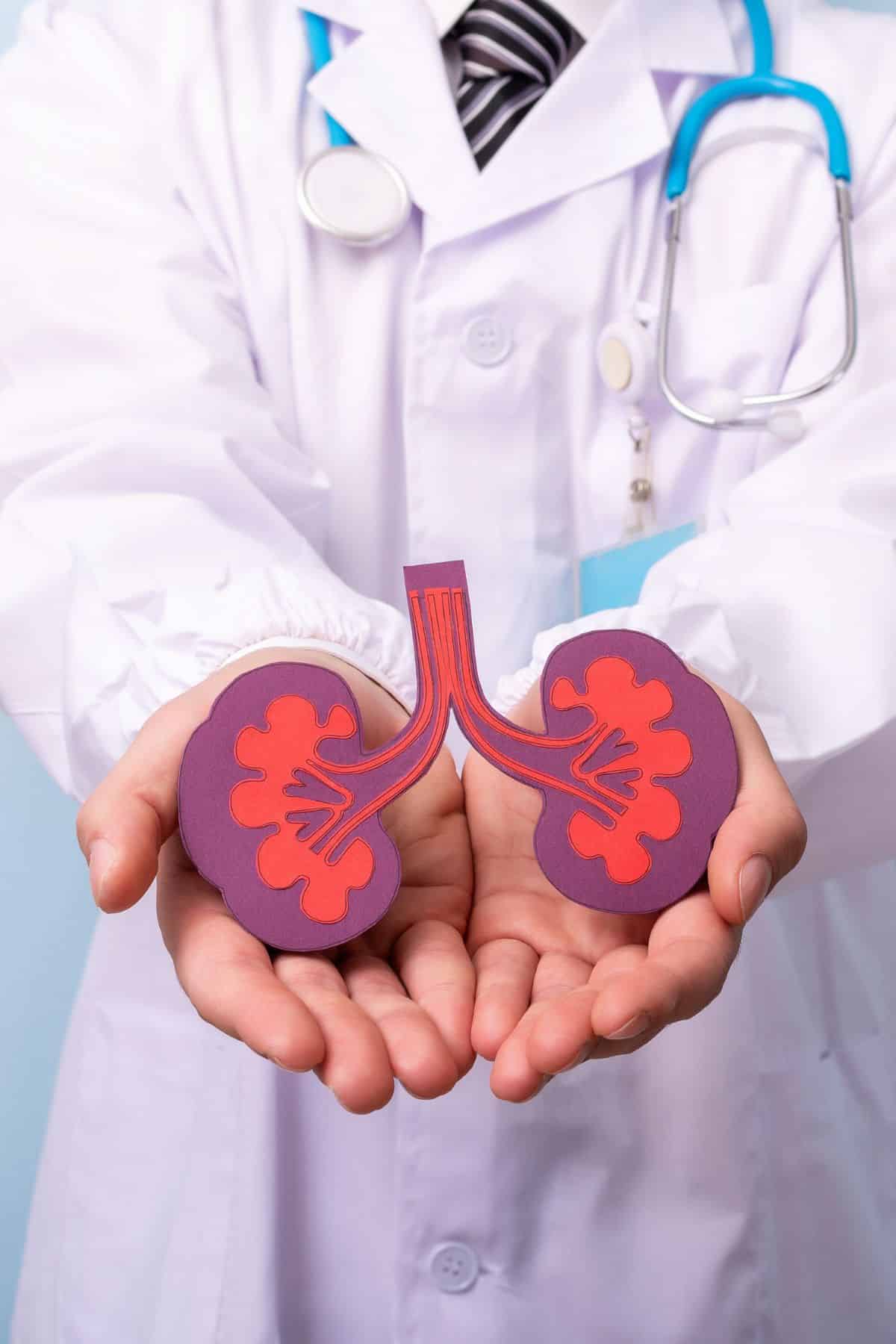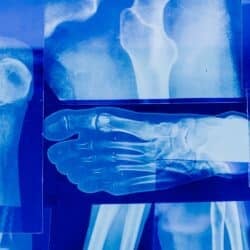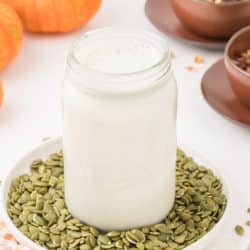12+ Vitamins and Herbs for Kidneys
Whether you have kidney disease or you want to prevent it, here are some vitamins and herbs to support kidney function. Find the food sources and supplements to support kidney health.

Intro to Kidney Health
Your two kidneys are located on either side of your spine, just under your rib cage. Along with your ureters and bladder, they form part of your urinary tract.
The kidneys’ main job is to filter your blood, removing any toxins and turning the waste into urine.
Every day, healthy kidneys filter around 200 liters of fluid and expel one to one and a half liters of urine. This urine then flows along your ureters (two thin tubes) and into your bladder, where it is stored.
Once your kidneys have filtered out the waste and toxic substances from your blood, they return vital substances like vitamins, glucose, and hormones to your bloodstream.
Your kidneys have other important jobs, too. They help maintain the balance of minerals, salts (like potassium and sodium), and water in your blood.
This healthy balance is essential for the efficient function of muscles, nerves, and other tissues throughout your body.
They also make the hormones needed to form blood cells, maintain bone health, and regulate blood pressure.
Kidney Conditions
When the kidneys are not functioning correctly, this hormone production is affected, leading to complications.
For example, if they produce too much renin – the hormone that regulates blood pressure – then blood pressure may increase, potentially leading to hypertension. This explains why many people with kidney disease also have high blood pressure.
Another common problem for sufferers of kidney disease is a higher risk of anemia, triggered by the insufficient production of the hormone needed to produce red blood cells.
Vitamins for Kidneys
1. Vitamin C
Vitamin C is an important antioxidant and helps reduce inflammation. Since chronic kidney disease is associated with inflammation, a diet containing sufficient vitamin C can have a protective effect.
Indeed, these benefits were noted in a study looking at the use of Vitamin C to prevent kidney injury in patients with COVID-19.
Vitamin C has also been shown to help guard against kidney cancer.
The best sources of this nutrient are fruits and vegetables, particularly citrus fruits, strawberries, bell peppers, tomatoes, potatoes, and cruciferous vegetables like carrots and broccoli.
However, you need to be careful with taking too much vitamin C intake if you already have kidney disease, because too much can cause a build-up of oxalate in your body. This can potentially lead to kidney stones and other problems.
The amount of vitamin C you get from your diet is not usually enough to cause this problem, but supplementation with high doses of vitamin C supplements could be an issue. Therefore, it’s important to discuss your vitamin C intake with your doctor if your kidney function is impaired.
2. Vitamin D
The main role of vitamin D is to help your body absorb calcium, which is essential for bone health.
We get vitamin D from two sources – exposure to sunlight, and food.
And the kidneys play a very important part in the process, as they convert the vitamin D from these sources into a form our bodies can use.
Chronic kidney disease is associated with very low levels of vitamin D, a problem compounded by the fact that damaged kidneys are less able to convert vitamin D effectively. This can result in muscle weakness and may cause the bones to soften.
Studies have shown that treatment with vitamin D can be helpful for patients with chronic kidney disease, whether in the early stages or at the point dialysis is required.
Vitamin D consumption may also help prevent kidney stones, and possibly kidney cysts too.
The best dietary sources of vitamin D are oily fish like salmon and mackerel, red meat, liver, eggs, and fortified products like cereal and milk.
You should speak to your doctor before taking a vitamin D supplement, however, as too much vitamin D can actually damage the kidneys.
3. Vitamin B6
Vitamin B6 has a range of important roles in the body, supporting the nervous and immune systems while promoting brain development.
It is found in a variety of foods, including liver, oily fish, garbanzo beans, poultry, fortified cereals, dark leafy greens, and fruits like papayas, bananas, and oranges.
Usually, our diets provide all the vitamin B6 we need, but people with existing kidney disease – or those with difficulties absorbing the nutrients from foods – might need a supplement.
That’s because they are far more likely to be vitamin B6 deficient.
A deficiency in vitamin B6 can lead to anemia – a lack of healthy red blood cells to carry enough oxygen to the body’s tissues. It can also cause depression, confusion, and a weakened immune system.
A large intake of vitamin B6 is also associated with a reduced risk of kidney stone formation in women.
Ask your doctor about supplementing with vitamin B or a blend of B vitamins including pantothenic acid.
4. Vitamin B12
An adequate intake of vitamin B12 isn’t directly connected to kidney health, but it’s a useful nutrient for general wellness. It helps make DNA and red blood cells, while also supporting the development and function of nerve and brain cells.
However, there is one way in which it can contribute to kidney health, and that’s by reducing the risk of pernicious anemia – a condition that often causes mild damage to the kidneys.
Vitamin B12 is only found naturally in animal-based foods like liver, red meat, poultry, eggs, fish, shellfish, and dairy products.
But it can also be obtained from fortified products like nutritional yeast, soy or rice milk, and cereals, which are good options for anyone following a vegan or vegetarian diet.
5. Vitamin E
Vitamin E is a fat-soluble antioxidant that helps protect the kidneys from damage by “free radicals” – unstable atoms that can cause aging and disease.
It also gives the immune system a boost and can help prevent clots from forming in the arteries of the heart.
What’s more, vitamin E therapy can be useful in preventing the formation of kidney stones.
There are lots of foods rich in vitamin E. These include:
- Almonds
- Peanuts
- Sunflower seeds
- Sunflower, safflower, soybean, and wheat germ oils
- Leafy greens like spinach, beet greens, and collard greens
- Red bell peppers
- Pumpkin
- Mango
- Avocado
Studies have shown just how useful vitamin E can be in preventing kidney damage or improving kidney function, and experts in Iran found that a higher dietary intake of vitamin E reduced the risk of chronic kidney disease.
Ask you healthcare provider about the best vitamin E vitamin supplement for you.
6. Vitamin K
This fat-soluble vitamin comes in two different forms – phylloquinone (the main form) that you get from green leafy vegetables – and menaquinones that you’ll find in fermented foods and some animal foods.
Vitamin K plays an important part in building bones and helps make the proteins needed for blood clotting so that wounds heal properly.
There is evidence that low vitamin K levels can lead to the progression of chronic kidney disease and may also be associated with the cardiovascular and bone complications that tend to accompany it.
In addition, a separate study shows that Vitamin K can help inhibit the growth of kidney stones.
7. Folate
Folate is a B vitamin that helps metabolize protein, form DNA, break down homocysteine (an amino acid that can be harmful in large amounts), and produce healthy red blood cells.
Furthermore, it has been shown to be helpful in preventing the progression of chronic kidney disease in people with mild to moderate forms of the condition.
Folic acid in the form of folate is present in lots of different foods, including green leafy vegetables, beans, whole grains, sunflower seeds, peanuts, fresh fruit, and eggs.
It is also added to common foods like bread and pasta, and sold in supplementary form as folic acid. Your doctor might recommend folic acid if your levels are low, as our bodies absorb it better than the folate from foods.
8. Dandelion
Dandelion leaves have traditionally been used to help keep the kidneys healthy. While there’s not a whole lot of scientific evidence to prove their benefits, there have been a couple of interesting studies.
One showed that dandelion leaf extract helped protect the kidneys from injury induced by Cisplatin, an anticancer drug that often causes kidney damage.
Another looked at how dandelion leaves act as a diuretic, increasing the flow of urine. Although it was a very small study, results showed that people produced more urine within five hours of taking a dandelion extract.
Increased urination can be helpful in flushing the kidneys and reducing the deposit of crystals in the urinary tract, thereby preventing the formation of kidney stones.
Dandelion leaves are rich in antioxidants, too, and have anti-inflammatory properties.
To enjoy the benefits of dandelion, you can simply use the leaves in a salad – they have a peppery flavor, similar to arugula. You can also try sautéing them in olive oil, which reduces their bitterness a little, or steeping them in water to make tea.
You may also benefit from dandelion dietary supplements, but you should ask your doctor about it.
9. Nettles
Antioxidant-rich nettle leaves can be useful to the kidneys in a number of ways.
They are a natural diuretic, helping increase the urinary output and flushing the kidneys to prevent the accumulation of crystals.
They help stimulate the lymphatic system, which supports the kidneys in their job of removing toxins from the body.
They also help reduce inflammation, which can be an important factor in controlling the progression of kidney disease.
Nettle leaves are usually consumed cooked, or steeped in water to make tea. But you should check with your doctor before trying them, as they are not suitable for everyone and may interfere with blood pressure medication.
You can also take nettles as nutritional supplements.
10. Astragalus
Astragalus is an herb, used for centuries in traditional Chinese medicine and is believed to help boost immunity, protect the heart, and reduce inflammation.
It’s a herb that has been quite well studied in terms of how it can benefit the kidneys, and there have been some promising results.
This research – published in 2022 – revealed that astragalus root can be helpful for patients with chronic kidney disease, although it was noted that further studies are necessary to confirm its safety for long-term use.
An older study found that astragalus-based medicine helped preserve kidney function for patients undergoing dialysis.
Astragalus has also been shown to help prevent infections in people whose kidney function is impaired.
There are various ways to consume astragalus root. You can use it to make tea (you can even buy astragalus teabags), take capsules, or mix the powdered root with smoothies or oatmeal.
11. Turmeric
Turmeric root contains a pigment called curcumin which has long been revered for its anti-inflammatory and antioxidant properties.
These make it useful in supporting kidney health and slowing the progression of chronic kidney disease, although one of the biggest problems is its low bioavailability.
This means that our bodies have difficulty absorbing it, so we don’t reap as many benefits from it as we should.
One way to boost the bioavailability of curcumin is by combining it with piperine, an alkaloid present in black pepper. So if you’re cooking with turmeric, mixing it with oils and freshly ground black pepper will help increase the amount of curcumin you consume.
Similarly, look for turmeric supplements that list piperine as an ingredient.
However, you need to speak to your doctor before taking curcumin supplements, as studies have shown that they can increase the levels of oxalate in your urine, potentially leading to the formation of kidney stones.
12. Milk thistle
Milk thistle seeds have traditionally been used in medicine for many years, mainly as a treatment for diseases of the liver and the gallbladder.
But milk thistle can be very useful in supporting kidney health too.
Rich in antioxidants and anti-inflammatory properties, it has been found to help reduce the risk of diabetic patients developing complications like kidney disease.
There have also been studies of silymarin – an extract from the dried seeds and fruits of the milk thistle plant. Silymarin concentrates in the cells of the kidneys, helping repair and regenerate them.
Be sure to check with your doctor before taking milk thistle. Since it acts on the liver, it can interfere with a range of medications. It can also be unsafe for people with a sensitivity to ragweed or a history of hormone-related cancers.
FAQs
It is possible to take too many vitamins which may damage kidneys. Taking too many vitamins – particularly vitamins A, E, and K – can cause them to build up in your body. This can result in symptoms like dizziness and nausea and may potentially cause damage to your kidneys.Vitamin C can be problematic, too, possibly leading to a build-up of oxalate that can stay in the bones and soft tissues, causing pain. Always speak to your doctor before taking vitamin supplements.
Vitamins may not be able to completely prevent kidney disease and conventional treatments are necessary when kidney damage is present. However, the vitamins listed here can certainly help support your kidneys, slow the progression of kidney disease, and prevent any complications from developing.
Everybody’s circumstances are unique and there may be reasons why some supplements would be suitable for you, and others unsafe. For that reason, it’s very important to talk to your doctor before taking vitamin supplements if you have kidney disease.
Generally speaking, the foods richest in vitamins for kidney health include fresh fruits and vegetables, oily fish, eggs, liver, red meat, and whole grains.
More Vitamin Guides You Might Like
Conclusions
Your kidneys are important, life-sustaining organs, so it’s essential to consume a range of vitamins to help them function effectively. The vitamins and herbs listed in this guide may benefit the health of your kidneys, whether you want to guard against damage or put the brakes on the progression of existing kidney disease.
But, of course, it’s always important to speak to your healthcare provider before making any changes to your diet or supplement routine.
Don’t forget to join my newsletter list to get exclusive clean eating recipes and tips. The newsletter is 100% free with no spam; unsubscribe anytime.
About the Author: Carrie Forrest has a master’s degree in public health with a specialty in nutrition and is studying to be a holistic nutritionist. She is a top wellness and food blogger with over 5 million annual visitors to her site. Carrie has an incredible story of recovery from chronic illness and is passionate about helping other women transform their health. Send her a message through her contact form.
Note: this post is for informational purposes only and is not intended as medical advice. Please consult your healthcare provider for recommendations related to your individual situation.





















Excellent information, thanks for Sharing !